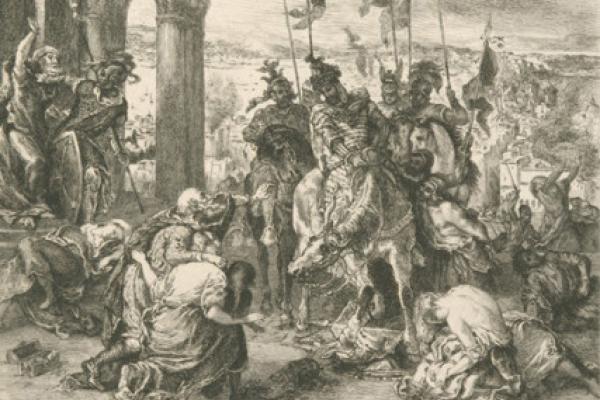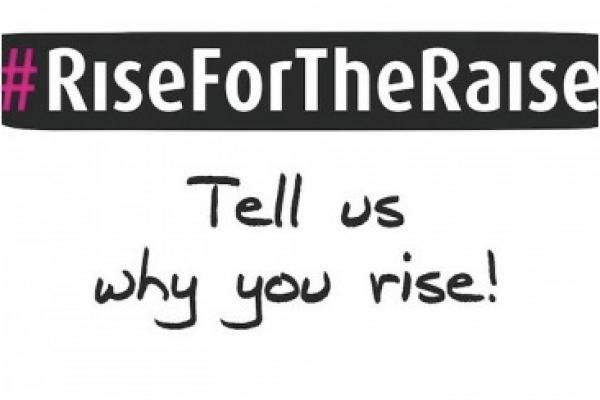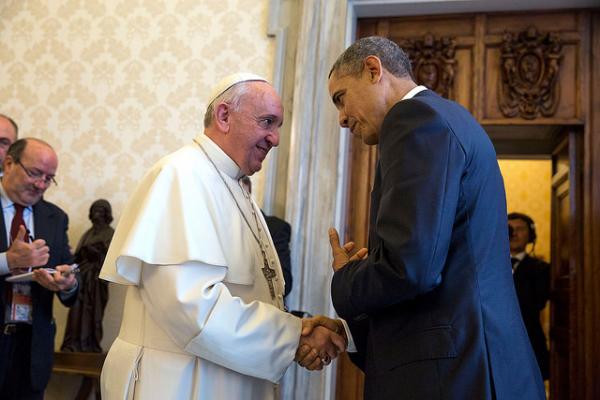America is a nation established on certain inalienable rights. The right to life. The right to liberty. The right to pursue happiness as one sees fit. The right, as a religious organization, to sue a government and its officials whenever you don’t get what you want.
You may not remember that last one from social studies class — and to be honest, I don’t recall Jefferson expounding upon it, either — but it is nevertheless a right the fundamentalist group Answers in Genesis and its president, Ken Ham, availed themselves of last week with the announcement of their forthcoming lawsuit against the state of Kentucky, its governor, and its tourism secretary.
The kerfuffle is over AiG’s Ark Encounter — the “creationist theme park” complete with a 510-foot wooden replica of Noah’s floating barn (except this one won’t float, plus it costs 70 million bucks) — and specifically, the $18 million in special tax incentives the Commonwealth’s tourism department had initially approved in 2011 before retracting them last year.
The goal of the incentives is to promote the construction of job-creating tourist attractions in Kentucky, and AiG’s project initially held water. What caused it to fall out of favor with the Bluegrass State was the group’s increasingly vocal insistence that it intended to: 1) require its employees to sign a statement of faith affirming, among other things, their devotion to the idea that the universe was created sometime more recently than the invention of beer by the Mesopotamians, and 2) operate the park pretty much like its Creation Museum — i.e., as evangelistic outreach.
As world attention shifts to the growing influence of Muslim militant groups on the African continent, few have paid any attention to the ongoing bloody conflict in South Sudan.
An estimated 50,000 people have died and 2 million have been displaced in the latest phase of fighting in this nation, according to the International Crisis Group, a think tank that aims to prevent and resolve such conflicts. That’s about five times more than in northern Nigeria, where the Islamist militant group Boko Haram has killed more than 5,000 people in six years.
“South Sudan’s conflict is not getting much attention due to shifting interests towards Islamic extremism,” said the Rev. Fred Nyabera of Kenya, a social scientist who is director of the Interfaith Initiative to End Child Poverty at the global faith-based organization Arigatou International. “This has become a global issue because of the immediate threats it poses to nations.
“But leaving South Sudan alone at this time when the people are trying to define their identity and country, under very fragile circumstances, is to postpone a big problem,” Nyabera added.
The conservative Twitterverse is all riled up because at Feb. 5 National Prayer Breakfast (an event founded and run by the secretive Christian organization known as The Fellowship), President Obama said that Christians, as well as Muslims, have at times committed atrocities. His words:
“Humanity has been grappling with these questions throughout human history. And lest we get on our high horse and think this is unique to some other place, remember that during the Crusades and the Inquisition, people committed terrible deeds in the name of Christ. In our home country, slavery and Jim Crow all too often was justified in the name of Christ.”
This would seem to be Religious History 101, but it was nonetheless met with shock and awe.
“Hey, American Christians–Obama just threw you under the bus in order to defend Islam,” wrote shock jock Michael Graham. Rep. Marlin Stutzman, R-Ind., called the comments “dangerously irresponsible.” The Catholic League’s Bill Donohue said: “Obama’s ignorance is astounding and his comparison is pernicious. The Crusades were a defensive Christian reaction against Muslim madmen of the Middle Ages.”
More thoughtfully, Russell Moore, president of the Southern Baptist Ethics and Religious Liberty Commission, called Obama’s comments about Christianity “an unfortunate attempt at a wrongheaded moral comparison. … The evil actions that he mentioned were clearly outside the moral parameters of Christianity itself and were met with overwhelming moral opposition from Christians.”
Really?
Religion writers get a lot of curious mail in their inbox. Our favorite this week was from Instapray, a social praying app.
Instapray does exactly what you'd think it would — matches communal prayer with the real-time get-it-anywhere nature of social media by allowing users to add, share, comment on, and update prayers. Like similar apps before it, there’s a spiritual motivation, too — users can mark that a prayer has been answered, or “repray” with others in solidarity of situation or spirit.
Most social prayer apps to date are some variation on Instapray, if less catchy/hokey in name — the Prayer Network, Ora, Intercede, Fellowshipper. Their thesis is clear — we often forget or don’t make time to pray; we don’t know who and what to pray for; we want to know our deep questions or petitions are being heard. (One also has to wonder whether the psychological pitfalls of digital social tools apply doubly when faith is involved — “What about all my prayers left publically unanswered? Why doesn’t anyone else share my prayer?".)
There’s a growing sense of partnership potential between Silicon Valley and faith communities, but the market for Christian social media to date remains largely untapped. It seems developers and faith leaders have yet to discover their collaborative sweet spot, where often-private religious inquiry best meets digital social tools. Instapray is one newer attempt at finding that nexus — success TBD.
In the meantime, here are 5 other Christian apps tooled to provide a closer walk with … well, each other.
The Francis Revolution is crossing the Atlantic and coming to the heart of the nation’s Capitol. News broke yesterday that Pope Francis has accepted Speaker John Boehner’s invitation to address a rare joint session of Congress during his upcoming trip to the United States on Sept. 24.
This is the first time that a pope has addressed Congress and provides a world-class opportunity for the Holy Father to lift up the Gospel’s social justice message to the most powerful legislative body in the world.
So what will the Jesuit from Argentina talk about? Studying his nearly two-year tenure as the Bishop of Rome suggests that Pope Francis will focus particularly on the scandal of inequality and exclusion.
Last April, Pope Francis tweeted that “inequality is the root of all social evil.” The seven-word tweet caused an uproar in American media, but the truth is that Francis had been saying the same thing for years. In his 2013 letter Joy of the Gospel, Francis wrote “just as the commandment ‘Thou shalt not kill’ sets a clear limit in order to safeguard the value of human life, today we also have to say ‘thou shalt not’ to an economy of exclusion and inequality. Such an economy kills.”
With reports last fall suggesting that economic inequality in the United States is at its highest levels since the Great Depression, Pope Francis will likely call on our elected leaders to transform our economy into one where no one is left behind.
If, as Cornel West affirms, “justice is what love looks like in public,” then Valentine’s Day should focus on fairness and equality for all.
That’s why Sojourners is celebrating Valentine’s Day with One Billion Rising, a global day of action to end violence against women. Through the #RiseForTheRaise campaign, we’re joining the fight for pay equity to help put an end to gender-based violence.
Unfair wages and economic injustice often leave women vulnerable to exploitation and abuse. When women, who make up two-thirds of the world's poor, are unable to meet their basic needs and support themselves and their families, they become at risk for all forms of violence—sexual, physical, emotional, and psychological.
Many women in search of economic survival fall prey to human trafficking, while others without financial resources remain in abusive relationships. Economic empowerment is key to breaking the gender trap of women, violence, and poverty.
In the U.S., women continued to be devalued. When women are paid less than men for equal work, we deny women their sacred worth and contribute to a culture that perpetuates violence against women and girls. It’s time to #RiseForTheRaise!
In God’s economy, all are created equal and should be treated fairly. It’s time for people of faith to rise up and close the gender pay gap.
By now, you may have heard that Jim Wallis and Sojourners have stopped funding climate change by divesting from fossil fuels. Unfortunately, for millions of Christians who invest at faith-based financial institutions, fossil-free investing just isn’t an option.
We’ve done our research. Of the 13 major Christian investment companies we studied, not a single one offers a way for their members to opt out of fossil fuels. We think Christian investment companies should be the FIRST to stop funding climate change! Read our open letter and sign below.
1. MLK's Mother Was Assassinated, Too: The Forgotten Women Of Black History Month
"Historical omission points toward a culture’s subconscious beliefs that some people matter less than others. When female stories are muted, we are teaching our kids that their dignity is second class and the historical accounts of their lives is less relevant."
"For the majority of new parents, whose penniless postpartum months (or weeks, or days, or whatever they can afford to take without pay, which is often nothing) are simply the result of the way things are in a country that venerates motherhood but in practice accords it zero economic value, the situation … makes parenting a privileged pursuit, takes women out of the workforce, and ultimately affirms public and professional life as being built for men."
3. WATCH: From Prison to the Pulpit
Rev. Darren Ferguson shares the story of his journey from an inmate at Sing Sing witnessing first-hand the effects of our broken criminal justice system to preaching from the pulpit. In this powerful video, he gives the viewer a glimpse into the realities of the system — and issues a challenge to the church.
4. Harper Lee, Author of ‘To Kill a Mockingbird,’ Is to Publish a Second Novel
With longstanding fame as a classic tale of racial and social injustice, 'To Kill a Mockingbird' is the lone work of author Harper Lee. Lee, 88, now reveals she wrote a sequel to the classroom favorite. The book, 'Go Set a Watchman' features a now-adult Scout visiting her aging father, Atticus.
5. No Worship Services in Public Schools, De Blasio Tells Supreme Court
In NYC Mayor Bill de Blasio’s 2013 campaign, the candidate opposed a city policy that prohibited churches from renting public schools for services. "In response, religious voters helped de Blasio trounce his opposition with 73 percent of the vote. But after de Blasio took office in January 2014, he didn’t make the change, even though it could be done executively." This month de Blasio went a step further by filing a court petition in support of the city’s policy.
6. A Republican Against Prisons
"One of the most potent arguments against mass incarceration, for conservatives, is that if you believe in limited government and are against dependence on the state, and you look at our criminal-justice system, you’re just not going to be very impressed by it. We have about one out of every hundred adults in this country under total state control. Think about that."
7. Islamic State Selling, Crucifying, Burying Children Alive in Iraq — UN
There is seemingly no end to the brutality perpetrated by ISIS. But this latest report details how the group is trafficking children — from Yazidi and Christian, but also Sunni and Shi’ite communities.
8. The Evolution of the Word ‘Slut’ and the Problems with Reclaiming It
An informative Q&A with Leora Tanenbaum, author of the recently released ‘I Am Not a Slut: Slut Shaming and the Age of the Internet.’ Tanenbaum takes on online harassers, the difference between ‘slut-bashing’ and ‘slut-shaming,’ and the implications of racial privilege in the conversation.
9. Croatia Just Canceled the Debts of its Poorest Citizens
"Although the program is expected to cost between 210 million and 2.1 billion Croatian kuna ($31 million and $300 million), according to conflicting reports by Austrian press agencyAPA and Reuters, the Croatian government expects economic long-term benefits that will outweigh the short-term investment."
10. Why There's So Much Riding on ‘Fresh Off the Boat’
As one AsAm FB friend put it, "I cannot believe I just watched an AsAm family on network TV. I also can't believe how long it took to happen."
Pope Francis will make an unprecedented address to Congress on Sept. 24 during his first visit to the United States.
House Speaker John Boehner announced Feb. 5 that the pontiff accepted the invitation Boehner extended last year.
“In a time of global upheaval, the Holy Father’s message of compassion and human dignity has moved people of all faiths and backgrounds,” Boehner said in a statement. “His teachings, prayers, and very example bring us back to the blessings of simple things and our obligations to one another.”
No pope or religious leader who serves as a head of state has ever addressed Congress, according to the U.S. House Historian’s Office.
In a brief statement, the Archdiocese of Washington said: “It is a great honor and tremendous joy to welcome our Holy Father, Pope Francis, to the Archdiocese of Washington during his proposed pastoral visit to the United States in September.
Some of you might be downright shocked to know that many clergy have to undergo a three-day battery of psych tests as part of the ordination process. If a significant issue is discovered, say, addiction or something else (perhaps the main reason these tests have become required), one's ordination process can be slowed down or halted all together. When I was going through the process, I too went through these evaluations.
The result? I have "a fragile sense of self."
What does this really mean? Well, I'm an alcoholic. It's true. I've spoken about it as part of my faith journey (read: testimony; yes, I have a testimony). I don't wave it around like some flag, but I'm not shy about telling people. And I have certainly told the congregations and other organizations I have served about my history with addiction.
Keeping this stuff secret, for me, is poisonous.
At any rate, there it was, "a fragile sense of self" on my evaluation. This caused everyone to pause. The ordination committee had a ton of questions for me. They did the obligatory background check (this is perfunctory; everyone gets one). They checked my references, etc. They did their due diligence to make sure, as best as anyone could, that I was not going to fall off the wagon.
Of course. No one can promise that. Not really.







